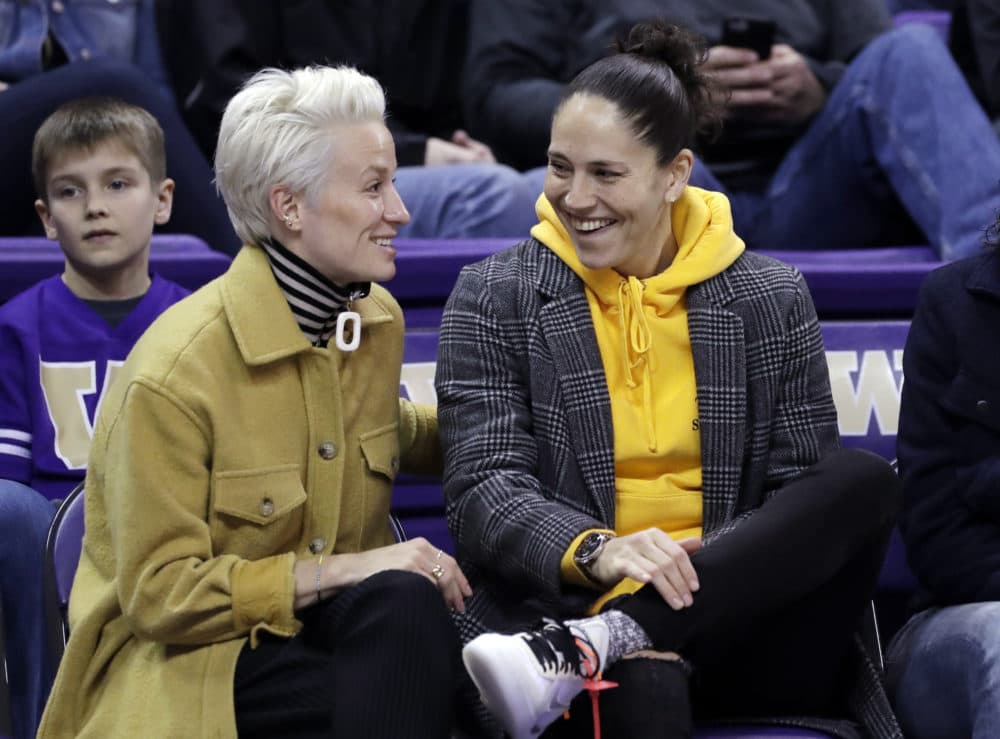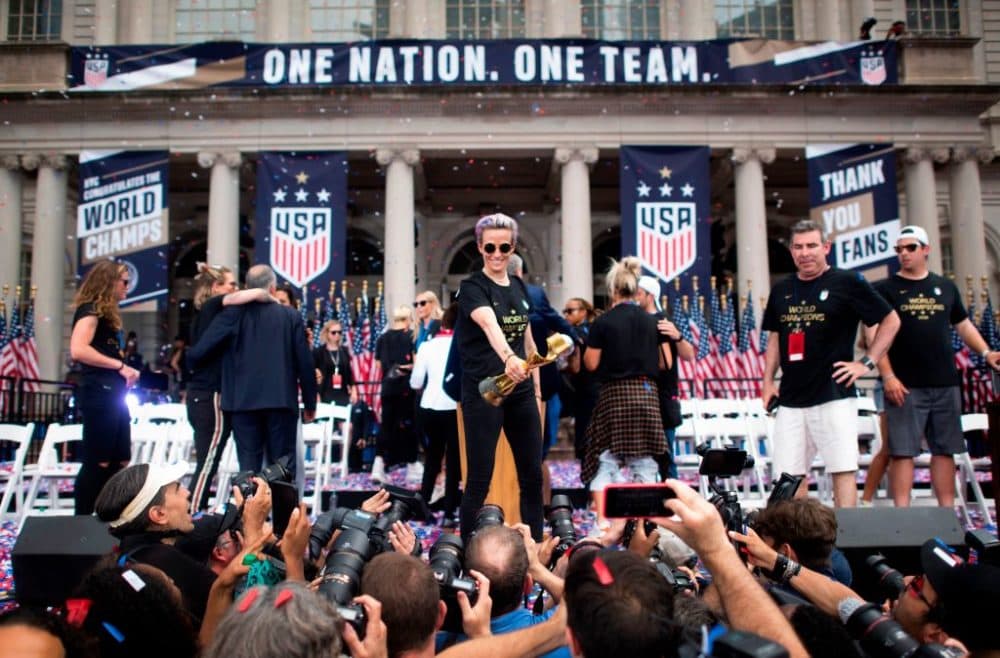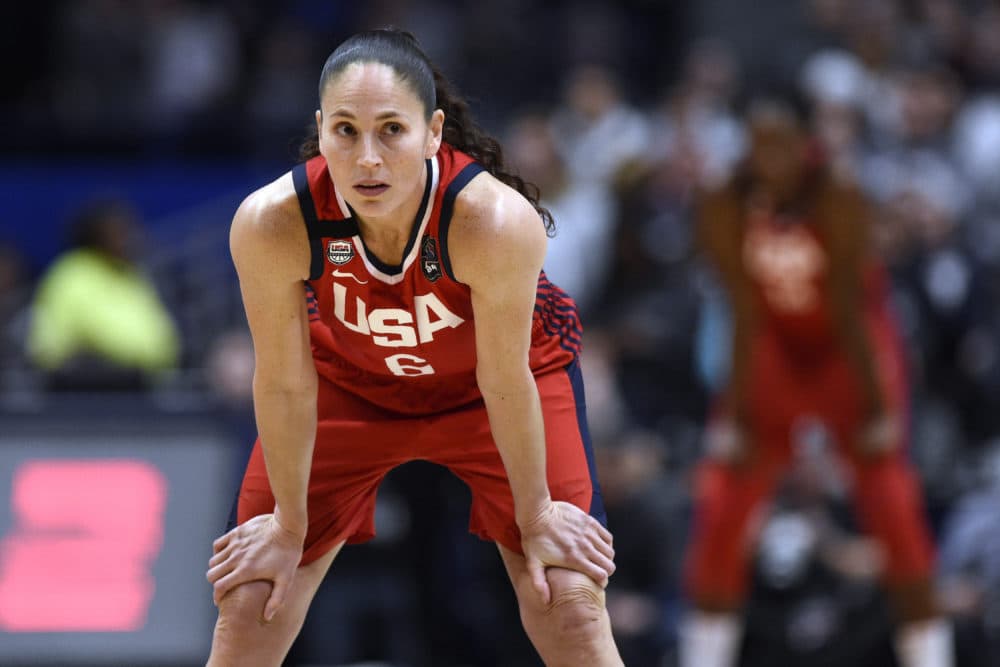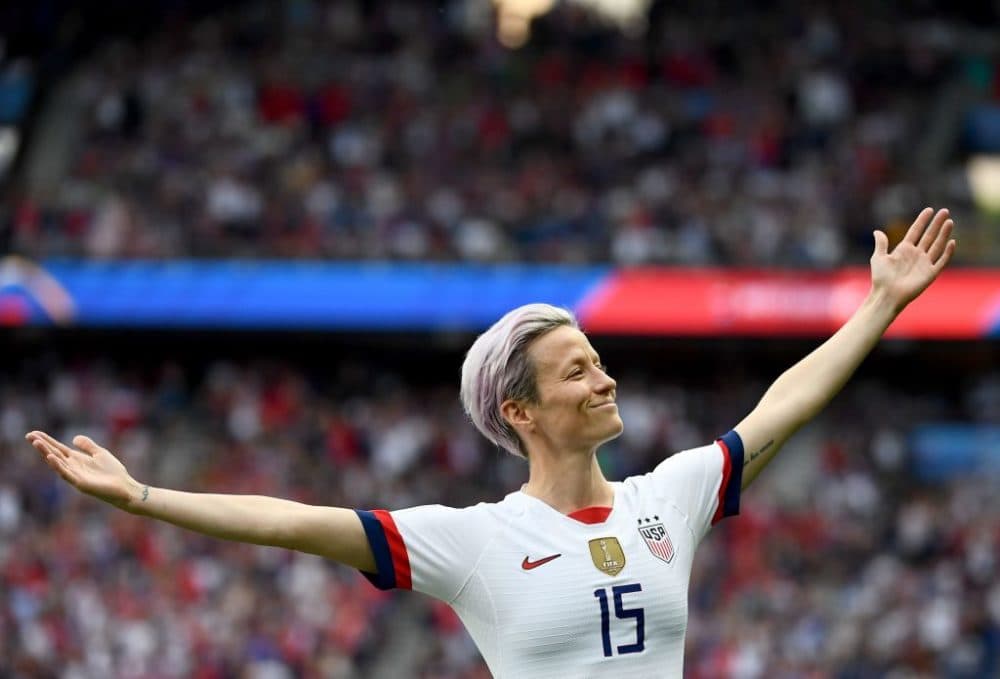Advertisement
Megan Rapinoe And Sue Bird On COVID-19's Effect On Women's Sports

For the fourth week, I'm broadcasting Only A Game from the closet.
But this week, the internet brought us a little pick-me-up — a joyful tribute in the face of so much bad news.
It was a recent Instagram Live from my favorite sports power couple: three-time WNBA champion and four-time Olympic gold medalist Sue Bird and two-time Women's World Cup champion and Sports Illustrated's 2019 Sports Person of the Year, Megan Rapinoe.
Sue Bird and Megan Rapinoe joined Only A Game to discuss what the pandemic means for the WNBA and NWSL.
KG: So, like the rest of us, you're staying at home right now. How you holding up?
SB: So far, so good.
MR: Yeah, we've been saying, I mean, we're really fortunate. You know, we have a place to shelter in place. And our jobs have been sort of postponed, but eventually we'll get those back and, you know, we're able to be safe and just kind of hole up for a while.
KG: I like to picture that the two of you, whenever it gets really stressful, you just break into song. That's what I like to hold in my heart.
SB: That was actually pretty just impromptu and random, to be honest.
MR: Yeah, the first one.
SB: Which actually makes it even better. Totally not planned.
"It felt like we had turned a corner. We were about ready to explode. And then this obviously happens."
Sue Bird
KG: So, there's actually a serious reason I wanted you to come on the show, and that story starts with what was supposed to be a big summer in women's sports. Sue, let's start with basketball. People are still talking about last year's WNBA final. The league has a new commissioner, a new labor deal, more games scheduled for TV. How did you feel about the momentum heading into the 2020 season?
SB: Well, we had it. That's for sure. You know, all the things you just listed. I think we were headed in a direction that we really hadn't been in in a while — maybe ever, to be honest, excluding the first couple years of the league. It felt like we had turned a corner. We were about ready to explode. And then this obviously happens.
So for a lot of reasons it's a big bummer for women's basketball. Another one is the NCAA Tournament. You know, there was a lot of excitement in women's college basketball, even. And that ultimately will impact the WNBA because all of those seniors were going to come into our league.
Obviously, basketball is probably the last on the list in terms of, like, life. But just in this one little conversation we're having, it's really unfortunate for women's basketball. Not to say that we can't pick up that momentum whenever we can, but it is a downer.

KG: So, Megan, as everyone knows, you're coming off a big World Cup win, and the women's pro soccer league here in the U.S., the NWSL, has also been gaining in attendance, attention and advertising dollars. This year's season opener between your OL Reign and the Washington Spirit was scheduled to be the league's first live national broadcast. It really feels like this is all being put on hold at the worst possible time.
MR: Yeah, it is not great timing. Coming off a great year — obviously the World Cup, but I think we also get momentum from other sports as well. Obviously the WNBA had their contract negotiations and, you know, what was a really big win not just for them but for other women's sports as well — and of course we would love to just kind of roll right into it. But this will just demand our creativity when we get back out there.
KG: Well, as all this was sort of happening, as the Olympics were postponed and seasons were delayed, I've got to think it had to be somewhat of a mixed bag for both of you. I mean, on the one hand, it's the only decision that could possibly be made for everyone's safety. On the other hand, it's got to be kind of scary to be told, as so many people are right now, "You just can't do your job."
SB: Yeah, I think we actually might have a little bit of a unique standpoint in that my dad has actually been, like, monitoring — he's a doctor, which kind of gives a little bit of street cred. But I'm not joking. I can remember the day because he was visiting me in Seattle. It was Feb. 23. And he was like, "I wouldn't be surprised if the Olympics are canceled." And I was like, "What? Get out of here."
MR: Yeah, we were like, "Herschel, that's extreme. Come on."
SB: But then — again, he was visiting for a couple days — so in those couple days, we had more and more conversations. I remember I even had, just in those couple days, had gotten to a point where I was like, "No, dad. If anything, they would go fan-less," like, "They would figure out a way." And I was relaying all this to Megan. Very quickly I was in a mental space of like, "Oh, my God. This might get canceled." So truth be told, when it finally came out that it was being postponed a year, [it] was music to our ears — kind of like, "At least it's happening."
Advertisement

MR: Yeah, it was kind of a weird time, too, the further it got along without canceling. It put a lot of stress on athletes. Most of the athletes haven't qualified yet. So to find pools to swim in, or, I don't know, judo players — like they're not going to be being able to practice — or if you have to get on a track.
So it was kind of putting this undue pressure when all the signs were kind of pointing to like, "OK, clearly it's not going to happen."And then, really, like, all that it takes to put on the Olympics during this global pandemic, this global crisis — we should probably be diverting those efforts and moneys and focus and brainpower into COVID-19 and not putting on the Olympics.
KG: Absolutely. Let's talk about some financials of the women's sports world. The minimum salary in the NWSL is just $20,000 a year. Most players in the WNBA rely on playing overseas to pay the bills. What could a prolonged stoppage mean for athletes in your leagues? And is there a lot of concern among your teammates?
MR: I think there is concern, yeah. As far as I know, the plan is to pay everyone through whenever this is — I think everyone's still hoping that at some point during the summer or late in the summer that at least a portion of the season will go on. But it is quite uncertain, and obviously for the financial stability of each team and of the league, it's going to be difficult to pay all the salaries out without having, you know, really any income coming in or being able to play those games. So it is worrisome for sure.
"It's going to be difficult to pay all the salaries out without having, you know, really any income coming in or being able to play those games. So it is worrisome for sure."
Megan Rapinoe
SB: Yeah, for us, you know, similar in that as far as this WNBA season is concerned, we don't know what's going to happen. We do have fairly regular calls with our commissioner. And, you know, there's updates. But then it's always like, "That's going to probably change in 24 hours." Because this whole thing is changing every day. I think at the end of the day, we won't know 'till we know. We don't have what a lot of people have been talking about with the NBA, which is the force majeure — we don't have that in our CBA. So that kind of adds a different wrinkle for us.
But more than anything, I mean, you mentioned a lot of us play overseas. That's where we make most of our money, to be honest — although the new CBA might have changed that. But most of our money's made over there. And, you know, those leagues had to stop this year. So a lot of the women were home probably by early March, let's call it. And so they missed out anywhere from two, two-and-a-half months worth of salary. And then I actually worry about next year's overseas market. Because I remember in 2008, 2009, when the market crashed, there were teams in Europe that folded.
I do think the WNBA will figure it out. I think it'll be fine long term. I actually worry more about overseas.
KG: You both must be speaking with other athletes about all of this. How do you help each other through all this uncertainty?
SB: A lot of group chats.
MR: "What are you doing at home?" "What are you doing at home?" "How are you getting your workout in?" Yeah, kind of seeing what everyone's doing and how everyone's keeping sane. I mean, everyone's pretty much doing the same things we are, just trying to be creative.
SB: A lot of memes being sent back forth.
MR: Yeah, a lot of memes.
SB: Not as much serious talk. I mean, I think early on — like I said, I had a lot of teammates who were overseas. So once that travel ban got put on for Europe, there was a couple of them flying back. And we were literally, like, every step of the way, I was like, "What's happening now? Are you in customs? What's that like?" Now it's kind of more into the light and fluffy, trying to help people kind of sort of get through the day with — like I said — memes, you know, trash talk, if you will. That happens. That's most of my group chatting — with my teammates, anyways.
KG: That's great. So one more serious question before we have a little fun. I think my worry is that when sports come back, and they will come back, that everyone's going to be so excited about the return of men's pro sports that the women's games are going to be even more forgotten than they are in a normal year. So I'm wondering what we can realistically do to keep the momentum going when sports return.
MR: I think we just need to keep out there and keep talking about it and keep putting our sport on display. No one has ever come to our games and left and are like, "Oh, that's not that exciting to watch." I mean, I think we need to have a concerted marketing effort once we get back and making sure that everyone knows when the games are — and they'll probably be a little bit more affordable than some of the other pro sports. But hopefully people will respect the fact, really, that we've continued to train this whole time and will come out and watch us play and support our leagues.

SB: This time is extremely unique. And I think a lot of female athletes — similar to male athletes, but a lot of female athletes— are popping up on podcasts and IG Lives. And we're obviously doing our own little IG Live. And I think part of what makes men's sport successful — yes, the way they play and all that good stuff — but also we know a lot about them. We see their personalities because, I mean, to be blunt, they're shoved in our faces — which, as a fan, I love all sports, so I don't mind it. But now I think you are starting to see a lot of female athletes. And that can draw people in as well. So hopefully that's a nice little bonus.
"The one thing I think we've learned also: You can't be too hard on yourself through this time."
Sue Bird
KG: Absolutely. It's been fun. I've been saying, like, "Now's the time — anyone you've been wanting to talk to forever, ask for them now because they have time."
SB: That's so true.
KG: So I want to end this conversation on a happy note. And all of us who have been asked to work from home have had some trouble adjusting to the new routine. I've had to get used to my closet here. And it sounds like you have not been entirely immune from that. I understand that you have something resembling actual exercise equipment now, but I'm hoping you can describe to me how you managed to keep working out without anything resembling real workout gear.
MR: We had, like, a backpack full of water bottles at one point.
SB: You've gotta get creative. So it was a backpack of water bottles. We weighed it on a scale. We were like, "OK, we've got a 20 pound dumbbell here." And then we had, like, a water jug we filled with water. Weighed that. And I was like, "All right, this is the 10 pound 'medicine ball' we're supposed to be using." Then we ordered some stuff. So it's gotten a bit easier.
MR: We were doing lunges in our hallway.
SB: We do step-ups on the coffee table, literally. Yeah, you just gotta get creative. Today, though, we have to find, like, a steep hill. Today we were looking on Google maps. I was asking my brother-in-law, I'm like, "Do you know of any steep hills?"
But you know what the one thing I think we've learned also: You can't be too hard on yourself through this time, right? All right, if I'm supposed to be doing X, Y and Z, and it's just too hard to figure out, that's OK.
MR: "I just did X."
SB: Just do A, B and C. Yeah, or just do X and call it a day and be kind. Be kind to yourself.
Follow Sue Bird and Megan Rapinoe on Instagram at sbird10 and mrapinoe.
This segment aired on April 11, 2020.
